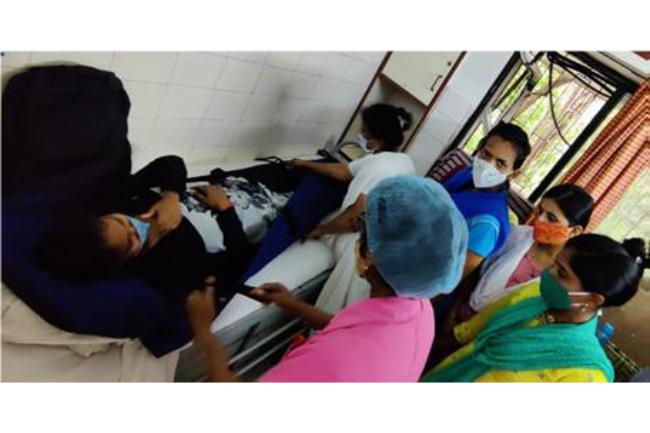TruCap Phase 2 - Empowerment Through Livelihoods Skills Training, Financial Literacy & Health Awareness
Gender: the root cause
Globally, the second largest ‘gender gap’ to bridge is, in the economic opportunities and participation. In India, despite being one of the fastest-growing major economies, the country ranks among the lowest in gender parity when it comes to economic participation and opportunity . Considering the size of population, significant, sustained efforts are still needed for sizable change to reflect on the global indicators.
The structural causes for this situation include 1: economic growth which has not been inclusive and is biased across genders and 2: Slow transitions from skills to employment – Traditional pathways to work are not keeping pace with evolving needs. As a result, India remains one of the countries with lowest female labour force participation (20% or less).
The Gap in Economic Opportunities
The majority of young people in India have limited access to education and training, with most finding economic opportunities only in the informal sector. High paying jobs are largely available to those who have access to higher education, making such opportunities accessible to only a small segment of the population.
Although India has a well institutionalized vocational training system, it has not adequately equipped its youth with the skills required by today’s industries. Vocational training in India has primarily seen success in engineering trades. Meanwhile, the health sector, despite its high demand for skilled staff in hospitals, dispensaries, and home-based patient care, has remained largely neglected.
Bridging this gap through quality vocational education across all genders, delivered by skilled trainers, has the potential to build a young and efficient workforce that can contribute meaningfully to the country’s sustained economic growth.
The proposed solution to the issue:
- • Dedicated programs focused on the socio-economic development, health, and well-being of women and non-binary individuals.
- • Enhanced access to education, skill development, workforce participation, and preventive healthcare to support the transition into economic independence.
- FPA India’s efforts towards improving the socio-economic status of young people through capacity building for job opportunities and livelihood sustainability.
High-quality male -friendly SRH services are provided in BS Maktha, MS Maktha and Raj Nagar regions of HyderabadFPA India’s livelihood skills training programme aims to equip young women, men, and LGBTQI youth from rural and peri-urban areas with employable skills and job opportunities. These individuals are often school dropouts, primarily due to financial constraints. The programme focuses on capacity building and economic empowerment, helping young people move towards sustainable livelihood and independence.
Objectives of the programme:
- • To enhance livelihood opportunities for marginalized and excluded individuals, prioritizing young women and/or persons of diverse sexual orientation or gender identities through delivering skills – based short term training course general duty cum bed-side attendants and offer placements ensuring the opportunities to become financially sustained.
- • Along with the livelihood skills trainings, sensitize young population on sexual and reproductive health and rights, provide preventive and curative SRH care to young and women from reproductive age groups.
Project design
The ‘General Duty cum Bedside Attendant Course’ offered by FPA India is designed to equip caregivers and patient attendants with essential clinical skills and adequate knowledge to support treatment and monitor patient care.
This specially structured four-month course is divided into two segments:
The course training includes lectures, demonstrations and question answer sessions, hands on training in the clinic set up, role plays, discussions and if required visits to institutions and the field for practical observation and situational analysis .
The curriculum includes clinical skills training such as taking temperature, blood pressure check, providing first-aid, dressings, infection prevention, instrument sterilization and autoclaving, bed making, bio-medical waste disposal, knowledge of basic medicine dispensing, and record keeping. Apart from this, trainees are also being provided with the skills in counselling, holistic approach of patient care, and soft skills. A series of comprehensive sexuality education are organised under the programme for young population enrolled in the course.
The programme is coupled with SRH care component of preventive and curative interventions such as HPV vaccination drives, cervical cancer screening and referral, SRH care.
ImpactSince 2017, FPA India has successfully trained a total of 2,091 trainees under the ‘Skill Development Project’ for the ‘General Duty cum Bedside Attendant’ course, across 13 locations in 7 states and 1 Union Territory.
Out of the total trainees who completed the course, 1,843 (88%) have been successfully placed in jobs at various nursing homes, hospitals, and other medical establishments, including home-based patient care.
Approximately 90% of the trainees were young women, who also opted for employment after completing the course.
FPA India’s Pune, Madurai, and Yamunanagar branches also reached out to the LGBTQI+ community, encouraging their participation in the program and supporting them towards employment. Notably, in Madurai and Yamunanagar, two transgender people successfully completed the course and were placed in jobs.
The course was implemented in the following locations (in alphabetical order): Bhopal, Dharwad, Gwalior, Kolkata, Madurai, Mohali, Mumbai, Mysuru, New Delhi, Noida, Panchkula, Pune, Singhbhum, and Yamunanagar.
CSR support for the program till now has been provided by HDB Financial Services (HDBFS) and TRUCAP.
Open a PDF file Click Here






